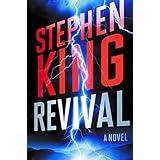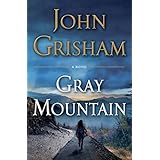
Stephen King starts off strong with his latest work, Revival. Jamie Morton is the central character of this novel. We first meet him when he is a pre-schooler, and follow him through a long and bumpy life. Along the journey, Jamie keeps running into Charles Jacobs. First, Jacobs comes to Jamie's small town as the new minister. He, his beautiful wife, and their adorable son become central to Jamie's and his siblings' world. Rev. Jacobs, in addition to being a minister, is a serious amateur scientist who is fascinated with electricity. When one of Jamie's brothers is injured in a skiing accident, the reverend seemingly cures him using electricity. It is not long after that that the reverend is also touched by a freak accident. His wife and child are killed in a horrific traffic accident. Jacobs is inconsolable after the loss and completely loses his faith. He gives a sermon which causes him to be immediately fired, and Jamie thinks he is out of his life for good.
Jamie's own fascination is the guitar. He picks up one belonging to his brother and, before long, he finds himself playing with a band. He loves the way girls react to him as a musician, and he loves being onstage. This leads him to a life with different bands, travelling from town to town. Eventually, he finds himself with a serious heroin addition, down and out in Tulsa, OK. (As a resident of Tulsa, by the way, I have to mention that King's portrayal of my town is less than flattering and exaggerates stereotypes about the state.) He goes to the state fair, hoping to buy drugs, and runs into Charles Jacobs. Jacobs saves his life by breaking his addiction and helps him get a job at a recording school in Colorado.
Jamie thinks Jacobs is out of his life for good, but, of course, he isn't. Jamie and Jacobs reconnect which leads to a horrifying ending to the novel. The ending, unfortunately, is where I think the novel lost its way. This is a story about faith, science, and magic. It is the story of a man obsessed with finding our what happens after we die. The ending, although it supplies an answer to the question, is neither horrifying enough to satisfy nor anticlimactic enough to give the novel an ironic twist. I really like the first 80 percent of this book, but the ending left a lot to be desired.
